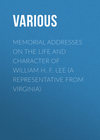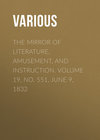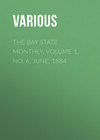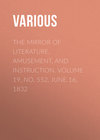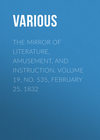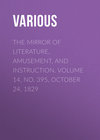Loe raamatut: «Memorial Addresses on the Life and Character of William H. F. Lee (A Representative from Virginia)», lehekülg 6
He rebuilt and reëstablished his home at the White House plantation. He was married November 27, 1867, to Miss Mary Tabb, daughter of Hon. George W. Bolling, of Petersburg. In 1874 the family removed to Ravensworth, in Fairfax County.
At both these places he cultivated his broad acres and interested himself in all matters relating to agricultural progress and development. He advanced and promoted these interests as president of the Virginia State Agricultural Society. He represented his county for a term in the State senate, but declined a reëlection, and returned to his plantation and the enjoyment of home life. After a few years of quiet he was called, in 1886, to a new field of activity by neighbors and political friends, who desired his services at the national capital, and he became the Representative from the Alexandria district in the Fiftieth Congress, and he was in his third term, when, on the 15th day of October, 1891, the hand of death removed him from his career of usefulness. For weeks his strong constitution and vigorous frame had resisted disease in his Ravensworth home. All that kindness and skill could suggest was done in his behalf, but skill and kindness were of no avail, and he bade adieu to home and family, companions and associates, earthly duties and surroundings, and entered upon his eternal rest. His mortal life was closed.
I well remember a day spent in his company nearly four years ago, and its occurrences gave me an opportunity to witness the regard in which he was held by those among whom he had lived and to whom he was best known. It was on Decoration Day, in a section of country where he had seen service as a soldier, not far from where he had lived in his early childhood. He was the orator of the occasion. Many of his old companions in arms and members of their families were among his audience, and they listened eagerly as he made appropriate reference to the departed comrades who slept under the little hillocks near by them, bright and fragrant with the flowers of early summer, which the loving hands of woman and childhood had heaped upon them. As he descended from the platform he was surrounded by old and young, who thronged about him to shake his hand or give expression to a friendly greeting. Admiration and affection were expressed upon their countenances for the brave man before them, whose gallant deeds had been told at every fireside in the country around, and who was loved and honored because, in addition to his own merits and virtues, he represented the great leader whose name was the embodiment of a precious memory.
I have portrayed William Henry Fitzhugh Lee as a student, a soldier, a planter, a public man representing his people in the State legislature and the National Congress.
Some have united in paying tribute to his memory because they were born and reared in the State which gave him birth, some because they shared with him the hardships and dangers of his military career, some because they were associated with him in Congressional life and committee work. But while I take a great pride in all that he accomplished in the after years, it is more pleasant to me to recollect him as the student, for in that relation I was first drawn into companionship with him; it was during that period of our lives that I first learned to regard him, and my tribute is to my classmate and friend of auld lang syne. May he rest in peace in the bosom of the honored State he loved so well and served so faithfully.
Address of Mr. Stewart, of Nevada
Mr. President: The biography of William H.F. Lee has been furnished by his colleagues and associates. I do not propose to dwell upon the details of his public or private career, or that of his distinguished ancestors, who acted so conspicuous a part in the history of the American Colonies and in the trying times of the Revolution by which our independence was gained.
I had the good fortune to form the acquaintance of Gen. Lee and his estimable wife at the beginning of the Fiftieth Congress. I was strongly impressed with his noble presence, and his genial, modest, and dignified bearing. He seemed to me an ideal specimen of true American manhood. His wife was a lady whose appearance at once attracted attention and whose qualities of head and heart charmed and delighted friends and associates. He was a devoted husband. His tender and gentle bearing toward his wife were natural and unaffected. The daily life and conduct of both were a conspicuous example of the benign influence of a husband and wife who love, honor, and respect each other.
My impressions of him were so favorable and agreeable as to create a desire on my part to cultivate his acquaintance and know more of his character. We met frequently, and discussed freely the social and political topics which engaged the attention of members of Congress at the national capital. He was modest and unobtrusive in the expression of his opinions; but as I knew him better I was profoundly impressed with the scope and breadth of his information.
His judgment of men and measures was as free from local prejudice and partisan bias as any man's I ever met. He was induced by his generous nature to attribute good rather than unworthy motives to those with whom he differed. He was honest, true, and unsuspicious. On all occasions he expressed attachment to the Union of the States, and manifested a patriotic devotion to the Constitution as the charter of our liberties.
He was a brave soldier, and fought on the losing side in a war that convulsed the continent and astonished the civilized world; and as a brave soldier he accepted without reservation the verdict of the war. It is to be regretted that his heroic services were not on the side of the Union, but the conditions which placed him in hostility to the flag of the United States are forever removed. Every cause which produced that terrible conflict was eradicated and obliterated in carnage and blood. The horrors of that fratricidal war are now history. The glorious results achieved are being realized in the abolition of slavery; in the Union of the States restored, strengthened, and cemented; in the respect, confidence, and just estimation of the people of all the sections for each other, and in the establishment beyond question of the capacity of the citizens of the Republic to dare and to do in great emergencies what to all the world seemed impossible.
To-day the virtue, the patriotism, and the renown of the fathers of the Revolution and the founders of our free institutions are the common heritage of all the people, both North and South. The gallant and daring exploits of Legion Harry or Light-Horse Harry Lee, the grandsire of the deceased, inspire the same admiration and respect in the sons of the North as in the sons of the South. It is most gratifying that the descendants of the comrades in war and associates in council who gained the independence and established the Government of the United States are again united in stronger bonds of interest, good fellowship, and respect than ever before existed.
Generations to come will enjoy not only the fruits of the Revolutionary struggle and the establishment of constitutional liberty, but they will be blessed with liberty that knows no slavery and with a Union forever indivisible, and they will contemplate with no partisan feeling the sacrifices which were necessary to secure such results. The type of manly virtue of which our deceased friend was a conspicuous example is one of the best fruits of free institutions. His death in the prime of his manhood and in the days of his usefulness was a great loss to the country and a bereavement to his family for which there is no earthly compensation. But he has left for them in his good name, his unimpeachable character, and his many virtues an inheritance more valuable than gold.
He has gone where all must soon follow. The wealth of his example is an inspiration to the living to emulate his virtues, enjoy a conscience void of offense, and leave to surviving relatives the inheritance of an honored name. Such an ambition is worthy of an American citizen, and the value to humanity of such a life as that of Gen. Lee can hardly be overestimated.
Why should death be regarded as a calamity? It is the inevitable fate of all the living. May it not be a part of life? The hope of immortality is the greatest boon conferred upon the living. On an occasion like this words will not soothe the grief of those who are near and dear to the deceased. Their consolation must be in the hope of reunion beyond the grave.
Address of Mr. Colquitt, of Georgia
Mr. President: It is a difficult and delicate task to draw with justice and propriety the character of a public man. Fulsome panegyrics have often been pronounced upon the character of the dead either out of flattery to the deceased or to gratify the ambitious desires of the living.
In paying a tribute to William H.F. Lee I am not influenced by any such questionable views. To do honor to his memory I need only say what justice and truth dictate. There is little danger, in speaking of him, of committing the offense of exaggerated eulogy. There is more danger of doing the injustice of understatement in commemorating a character so rounded and symmetrical.
As a son, Gen. Lee's filial piety was so marked as to make him an example worthy of all imitation by the youth of his country. In every post of honor or trust to which he was called—and they were many and exalted ones—he met his engagements with such fidelity and courage as never to incur censure and seldom provoke criticism.
His bearing as a private citizen was of such dignity and benevolence as to secure the love, while it evoked the admiration, of all who knew him.
His character was made up of blended chivalry and courtesy and adorned with the mild luster of a religious faith.
He was frank and open, plain and sincere, speaking only what he thought without reserve, and promising only what he designed to perform.
As he was plain and sincere, so he was firm and steady in his purposes; courteous and affable, he was not influenced by servile compliance to his company, approving or condemning as might be most agreeable to them. He was a man of courage and constancy, qualities which, after all, are the ornaments and defense of a man.
He had in the highest degree the air, manners, and address of a man of quality; politeness with ease, dignity without pride, and firmness without the least alloy of roughness. He loved refined society, but he had great respect and sympathy for those who had been reared in simple habits and the toils of life.
He possessed an even and equal temper of mind. Those who best knew him can testify of him what has often been asserted of his great father, that they never heard an acrimonious speech fall from his lips; that his whole temper was so controlled by justice and generosity that he was never known to disparage with an envious breath the fame of another or to withhold due praise of another's worth.
Mr. President, the friends of Gen. Lee do not claim for him brilliant talents and the gifts of genius. It is doubtless a beneficent ordination of Providence that the best interests of society are not solely dependent on what in common parlance is called genius. Fortunately for the good of mankind, great gifts and powers of mind are not indispensable to our happiness or to a safe and salutary development of social conditions.
Patient industry and impregnable virtue are the essential cardinal qualities that make the man, in the vast majority of cases, worthy of love and honor, and which conserve the best interests of the world.
That man who in his career and relations to society has gone on from day to day and from trust to trust, never disappointing but always realizing every just expectation, it seems to me is the character who deserves of his fellow-men the highest meed of praise, and gives in his person and example the surest guaranty that the world will be all the better for his agency in shaping its affairs.
The friends of Gen. Lee enjoy the perfect assurance that in every walk of life, on every occasion when duty called him, his responses were ever marked by a dignified and intelligent performance of the tasks assigned him.
What higher honor can we ask for him than this: that weighty as were the responsibilities that devolved upon him by inheritance and high as the expectations which were the natural implications of this inheritance, he fully and nobly met them. Much as was expected of him, he more than realized the claims and obligations of a noble lineage. His fellow-citizens and his contemporaries regard his career as an honor and his companionship as a delight and a resource that adds poignancy to their grief in the loss of so loved and valued a friend.
I might refer to the incidents of his military career to illustrate his courage and fidelity, but it may not be considered appropriate to the time and the occasion. It is cheering, however, to believe that in this exalted body there is not to be found that spirit of truculent uncharitableness which refuses any credit to an honorable adversary.
Time, which touches all things with mellowing hand, has softened the recollections of past contests, and they who looked upon him as a foe now only remember the glory of the fight, and would join hands with us to weave the garland of his fame.
Securely may the friends and admirers of this noble character rest in the belief that his name for generations to come will be enrolled in the glorious list of worthies that has for all time made the name of Virginia illustrious and among the foremost of all the commonwealths of the ages past.
Address of Mr. Butler, of South Carolina
It was my good fortune, Mr. President, to know Gen. William H.F. Lee with the intimacy of personal friendship for more than a quarter of a century, and I can pass no higher encomium upon him than by saying he had all the qualities that constitute a true gentleman, a gentleman in the highest and best sense. He inherited from a very illustrious and distinguished ancestry a prestige rarely enjoyed in this country, and yet he was as unpretending, unaffected, and modest as the humblest man. His self-contained dignity of character never deserted him. His placid, well-balanced, well-poised equanimity always sustained him.
It would be extravagant to say he inherited the commanding abilities of his illustrious father, but it would be entirely within the line of a just criticism to affirm that he did inherit many of the highest characteristics and qualities of that great man. In personal demeanor, in that suave, gracious, considerate, self-respecting, and respectful bearing which give assurance of the perfect gentleman he very much resembled his father. He was always approachable and cordial, and yet I doubt if any man ever attempted an improper liberty or ventured undue familiarity with him. His high character and affability of manner protected him against such relations.
In the late civil war we served side by side in the same cavalry corps in the same army almost continuously from the beginning to the end. I therefore had the best opportunities of forming a correct estimate of him as a soldier and man, and it is within the bounds of just judgment to place him among the most distinguished in that brilliant array of American soldiers and men of that eventful period.
I recall with vivid recollection my first association with him at Ashland, Va., in June, 1861, where he was stationed as a young captain of cavalry at a school of instruction. Thence he rose by regular gradations to major-general of division, resigning his sword with that rank.
Gen. Lee never aspired to be what is sometimes called a "dashing" soldier. He was quite content with the serious, earnest, steady performance of his duties. It would be no compliment to say that a son of Robert E. Lee and grandson of "Light-Horse" Harry Lee had courage. Such a quality is a necessary ingredient of such a man's character. But his courage was not of that frothy, noisy kind so often paraded to attract attention. In battle he was as steady, firm, and immovable as any soldier who ever wielded a sword or placed a squadron in the field. In his relations to his subordinates he was the perfection of military propriety, always considerate and kindly, but firm and impartial in the enforcement of discipline.
Towards his equals and superiors in rank he bore himself with a knightly chivalry that at once commanded respect and confidence. How could he have been otherwise, descended from such a noble sire, with such an example of courtly dignity and untarnished manhood?
After the close of hostilities, having discharged his whole duty as he understood it with fidelity and courage, he retired to his native State, to his farm, and there, by the same quiet, honorable, manly course of conduct devoted himself to the duties of civil life, establishing by his example a standard of citizenship worthy the great Republic to which he renewed his allegiance.
The people of the Commonwealth of Virginia could not and did not permit a man of his exalted character, sound intellectual qualities, and safe, conservative judgment to remain in private life. His services and example were too valuable to the public, and he was called into the public service, first as senator in the State legislature, later into the lower House of Congress.
There, as elsewhere, he soon took rank among the wisest and safest legislators in the body pursuing the even, modest tenor of his way with that faithful regard for his duty to his constituents and his country that characterized every relation and position of his life.
Those of us, Mr. President, who were favored with his acquaintance recall with a respect bordering on reverence his commanding figure as he came in this Chamber, his courtly presence, his gentle bearing, persuasive conversation, amiable, respectful manners. The consciousness that we shall never see him again is a sad and depressing reflection, and a mournful reminder that it is only a question of time—how long mortal man can not foretell—when those of us who survive him must obey a similar summons, and disappear, as he has done, from the scenes of life forever.
In paying tributes of respect and affection to departed friends I know how hard it is to impose restraint upon our partiality for them and how strong the temptation to indulge in expressions of exaggerated eulogy. Knowing Gen. Lee as I did, I can say of him with absolute sincerity and truth that he was as free from the small and petty faults of our nature as any man I have ever known. In his private relations he was literally without guile or deceit. Straightforward, honorable, just in all his dealings, he was a model citizen and faithful friend.
In his public life he proved himself equal to every station. Zealous, attentive, conscientious, untiring, he met every responsibility with fidelity and confidence. He never disappointed a friend, betrayed a trust, or took unfair advantage of an opponent. In a word, Mr. President, he lived a perfect gentleman, discharged faithfully every duty of life, and died honored and beloved by his friends.
Others have spoken of the life and character of this distinguished man more in detail, more eloquently, with more finished oratory, but I yield to none in the sincerity of my humble tribute to his memory.
Address of Mr. Dolph, of Oregon
Mr. President: The echoes of the voices of those who pronounced eulogies upon the life and character of the late distinguished Senator from Kansas have hardly died away in this Chamber, and we have again laid business aside to pay our tributes to the memory of a late honored member of the House of Representatives and a distinguished son of Virginia.
These sorrowful occasions, which are deprecated by some as involving a loss of the time of the Senate and needless expense to the Government, I can not think are unprofitable to us or to the country. Surely in the mad rush and hurry of business we may be permitted to halt long enough to take notice of the invasion of our ranks by death and to voice our esteem for a departed member. The death of an eminent member of the Senate or of the House is not only a loss to his immediate constituency, but to the whole country, and, in accordance with a long and honored usage, demands from his former associates formal and appropriate action.
After such an hour spent in the contemplation of the common end of all that live, in introspection and retrospection, who of us does not again take up the burdens of life with renewed resolutions to redouble our energies to faithfully discharge every public and private duty.
My acquaintance with Mr. Lee was not intimate. I frequently met him socially, but he did not belong to the party with which I am affiliated, and no fortuitous circumstance occurred to bring us together in the discharge of public duties. The incidents of his life, his public services, and his domestic relations have been fittingly alluded to by others, and it only remains for me to cast an evergreen upon his grave, to add my poor tribute to his memory, and give expression to the emotions awakened by the occasion and the exercises of the hour. Coming from a long line of distinguished ancestors, serving with marked distinction in the Confederate army until the cause he championed was hopelessly lost, honored by the people of his State by election to high civil positions, in which he did credit to himself and honored them with a rounded character and well-developed manhood, at once the incarnation of gentleness, tenderness, and courage, it is not to be wondered at that sorrow for his death hung over his State like a funeral pall, and all parties vied with each other in giving expression to the universal sense of private and public loss.
He was the son of a distinguished sire, who in life was the idol of the people of Virginia; but he was held in the highest esteem by the people of his State not so much on account of his illustrious father as on account of his own ability and worth. His public services and his blameless life, touching, tender, and beautiful, won the tributes to his memory pronounced by his colleagues at the other end of this Capitol. Fortunate, indeed, is the man who can win such admiration from his associates.
What higher eulogy can be pronounced on any man than that in every station, public and private, he was true to himself and faithful to the people and was equal to the duties of his station? Not every man can become great; genius is the gift of the few, but goodness and fidelity to duty are within the reach of all. He has gone the way of all the living. He has found the level of the grave. Our words of eulogy can not reach him there.
Can honor's voice provoke the silent dust,
Or flatt'ry soothe the dull, cold ear of death?
Solomon, summing up this question, said:
For the living know that they shall die: but the dead know not any thing, neither have they any more a reward; for the memory of them is forgotten.
Also their love, and their hatred, and their envy, is now perished; neither have they any more a portion for ever in any thing that is done under the sun.
To human reason the death of him we mourn was untimely. He was born May 31, 1837, and died October 15, 1891. He was therefore in the prime of manhood, and apparently had many years of useful life before him. But death sometimes strangely selects his victims. No season, no station, no age is exempt from his fatal shafts. When death comes to the aged as the end of a fully completed life we regard it as natural. But when death comes to the young, the gifted, and the promising, we with our finite vision look upon it as sad and mysterious. We are constantly reminded that—
The boast of heraldry, the pomp of power,
And all that beauty, all that wealth e'er gave,
Await alike the inevitable hour.
The paths of glory lead but to the grave.
It is creditable to our humanity that at the grave animosities are buried, and those who speak of the dead remember their virtues and pass over their frailties.
Death is a mighty mediator. There all the flames of rage are extinguished, hatred is appeased, and angelic pity, like a weeping sister, bends with gentle and close embrace over the funeral urn.
The reconciling grave swallows distinction first that made us foes; there all lie down in peace together.
To the grave, "the world's sweet inn from pain and wearisome turmoil," we are all hastening. Earth's highest station and meanest place ends in the common receptacle to which we shall all be taken. Dark and gloomy indeed would be the grave without a hope in a personal immortality, a belief that the soul survives the body, and that to this immortal part the tomb is the gate to heaven. When one feels like Theodore Parker when he said:
When this stiffened body goes down to the tomb, sad, silent, and remorseless, I feel there is no death for the man. That clod which yonder dust shall cover is not my brother. The dust goes to its place; man to his own. It is then I feel my immortality. I look through the grave into heaven. I ask no miracle, no proof, no reasoning for me; I ask no risen dust to teach me immortality. I am conscious of eternal life.
Or like Byron when he wrote:
I feel my immortality oversweep all pains, all tears, all time, all fears, and peal, like the eternal thunders of the deep into my ears this truth—thou livest forever!
Death loses its terrors and the grave becomes a welcome goal for weary and buffeted mariners on life's stormy sea—the gate to endless life.
By these oft-repeated scenes in this Chamber; by the frequent visits of the stern messenger to both Houses of Congress to summon a member from his field of labor here to the bar of the Supreme Ruler of the Universe above; by the constant changes going on around us in obedience to the inevitable law of nature, by which death everywhere succeeds to life, we are reminded that we shall not long continue as we now are. It is possible that as we are startled by the announcement of the death of an associate we mentally ask ourselves, Who will be called next?
So live, that when thy summons comes to join
The innumerable caravan which moves
To that mysterious realm where each shall take
His chamber in the silent halls of death,
Thou go not, like the quarry slave at night,
Scourged to his dungeon; but sustained and soothed
By an unfaltering trust, approach thy grave
Like one that wraps the drapery of his couch
About him, and lies down to pleasant dreams.
